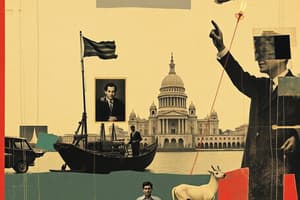Podcast
Questions and Answers
What was a common belief among liberals and radicals regarding individual efforts?
What was a common belief among liberals and radicals regarding individual efforts?
- It only benefited the wealthy elite.
- It should be discouraged for the welfare of the community.
- It was vital for societal development. (correct)
- It undermined the social structure.
What drove the wealth of liberals and radicals in the early nineteenth century?
What drove the wealth of liberals and radicals in the early nineteenth century?
- Speculative financial practices.
- Trade and industrial ventures. (correct)
- Government handouts and subsidies.
- Inheritance from aristocratic families.
What was the main opposition of liberals and radicals towards the older aristocracy?
What was the main opposition of liberals and radicals towards the older aristocracy?
- Their reliance on trade.
- Their privileges based on birth. (correct)
- Their lack of education.
- Their political disenfranchisement.
Which factor did liberals and radicals believe was essential for the health of the workforce?
Which factor did liberals and radicals believe was essential for the health of the workforce?
Who rallied around liberal and radical groups and parties in the early nineteenth century?
Who rallied around liberal and radical groups and parties in the early nineteenth century?
How did the beliefs of liberals and radicals shape their view of economic development?
How did the beliefs of liberals and radicals shape their view of economic development?
What was the relationship between property ownership and the ideology of liberals and radicals?
What was the relationship between property ownership and the ideology of liberals and radicals?
In what way did the advocates of liberalism and radicalism challenge the old aristocracy?
In what way did the advocates of liberalism and radicalism challenge the old aristocracy?
What role did education play in the vision of liberals and radicals for society?
What role did education play in the vision of liberals and radicals for society?
Describe the appeal of liberal and radical groups to working men and women in the early nineteenth century.
Describe the appeal of liberal and radical groups to working men and women in the early nineteenth century.
Study Notes
Ownership and Economic Beliefs
- Almost all industries were privately owned by individuals, reflecting strong individual property rights.
- Liberals and radicals were typically property owners and employers, revealing a duality in their socioeconomic status.
- Wealth accumulation through trade and industrial ventures led to a belief in encouraging economic effort and enterprise.
Workforce and Education
- A healthy workforce and educated citizens were thought essential for economic success and societal benefits.
- Emphasis on individual labor and initiative was viewed as a driving force for societal advancement.
Opposition to Aristocracy
- Liberals and radicals opposed the privileges associated with birth and the old aristocracy.
- They advocated for individual freedoms, asserting that success should be based on merit rather than social class.
Social Mobilization
- Many working-class individuals sought societal changes and were drawn to liberal and radical movements during the early 19th century.
- The rallies around these groups represented a collective call for reform and empowerment among the labor force.
Ownership and Economic Beliefs
- Almost all industries were privately owned by individuals, reflecting strong individual property rights.
- Liberals and radicals were typically property owners and employers, revealing a duality in their socioeconomic status.
- Wealth accumulation through trade and industrial ventures led to a belief in encouraging economic effort and enterprise.
Workforce and Education
- A healthy workforce and educated citizens were thought essential for economic success and societal benefits.
- Emphasis on individual labor and initiative was viewed as a driving force for societal advancement.
Opposition to Aristocracy
- Liberals and radicals opposed the privileges associated with birth and the old aristocracy.
- They advocated for individual freedoms, asserting that success should be based on merit rather than social class.
Social Mobilization
- Many working-class individuals sought societal changes and were drawn to liberal and radical movements during the early 19th century.
- The rallies around these groups represented a collective call for reform and empowerment among the labor force.
Studying That Suits You
Use AI to generate personalized quizzes and flashcards to suit your learning preferences.
Description
Explore the fundamental principles of liberal and radical economic thought. This quiz delves into the beliefs surrounding individual effort, labor, and the opposition to aristocratic privileges. Test your knowledge on how these ideologies influenced industry and workforce health.



